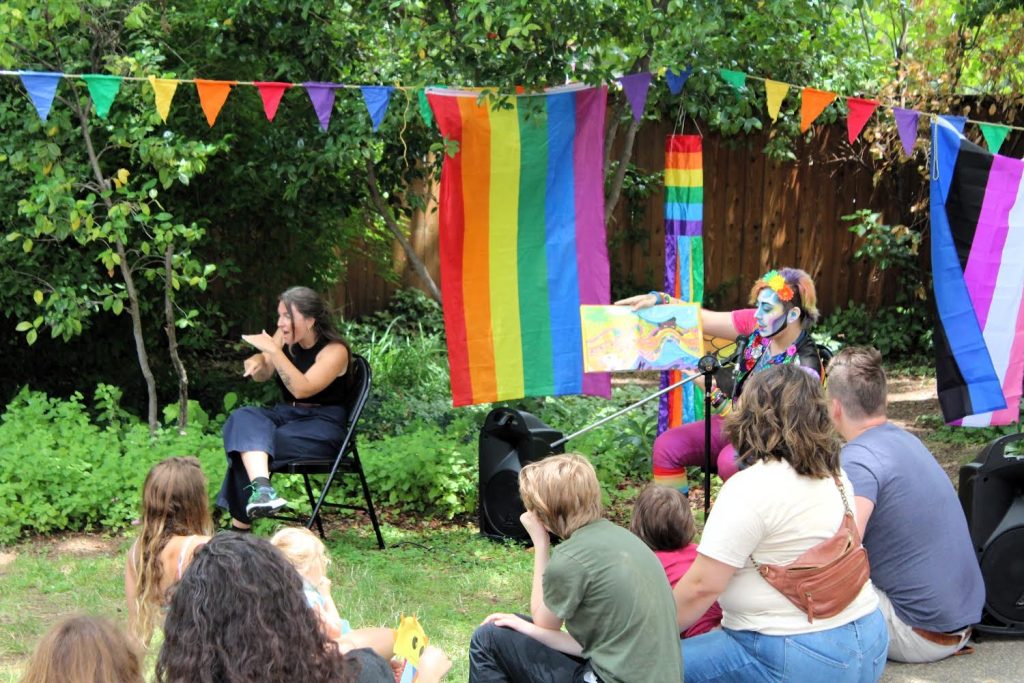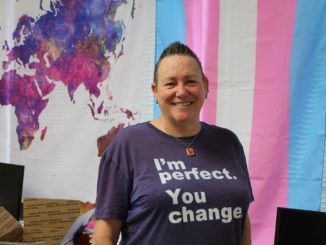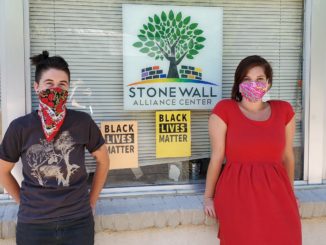![02news1[a]-Conner & Emma(1)](https://chico.newsreview.com/wp-content/uploads/2023/08/02news1a-Conner-Emma1-678x381.jpg)
Christian Lucero grabbed a zebra-patterned tie and slung it around his shoulders. With an encouraging smile, he faced the teenager in front of him at Stonewall Alliance Center in Chico and began teaching them how to tie a tie. Though it was their first time, the teen nailed it. Nearby, Sir Vix taught another teenager how to apply makeup. The teen beamed when they saw their reflection in a mirror.
During Chico Pride this June, Lucero, a queer trans man and drag king, partnered with the LGBTQ+ advocacy nonprofit and Vix, a trans nonbinary drag king, to provide a gender euphoria workshop for teenagers. At the workshop, the pair also talked with the teens about gender identity and expression.
Gender euphoria is “about us coming to terms and accepting and loving who we are,” Lucero said, “being able to find peace, love and joy in whatever clothing, makeup, and level of expression you are in.”
This year, gender identity debate has been at the forefront of local politics. It began with a lawsuit filed against Chico Unified School District in January, in which a local mother claimed that the district transitioned her child without her consent and violated her parental rights. Then, in May, students at Pleasant Valley High School protested trans students using bathrooms that align with their gender identity, and in June, others gathered to protest outside a Stonewall Drag Storybook Hour for children.
Though the case—Regino v. Staley, et al.—was dismissed by a federal judge in July, local debate has continued, and local U.S. Representative Doug LaMalfa and State Assemblyman James Gallagher have since proposed laws that would restrict access to gender-affirming health care and protections for trans students at schools.
Research from The Trevor Project shows that such anti-LGBTQ+ policies and legislation are harmful to youth mental health. Victimization and discrimination contribute to higher rates of suicide, and trans and nonbinary youth in particular report much higher rates of anxiety, depression and suicide ideation and attempts than cisgender teens. Conversely, when LGBTQ+ youth are supported by parents and teachers, and have access to affirming spaces and people in their lives who respect their pronouns and gender identity, their mental health improves and they are less likely to commit suicide.
Though Stonewall Alliance Center is operated by a small staff still dealing with the impacts of the pandemic, its team continues to provide an affirming safe space with resources, referrals, counseling, events, workshops and support groups for LGBTQ+ youth. In response to local events, Stonewall also is developing new programming.
“We’re making ourselves known as clear allies and supporters, and because of that we are facing backlash,” said Justina Sotelo, Stonewall’s events coordinator. “That backlash is emotionally hard to see, but at the same time, we know the community we support and the community we advocate for is one that is disenfranchised and needs that.”
Fighting for trans youth
Emma Schutz Fort dumped a bin of colorful stuffed animals onto a table at Stonewall Alliance Center. On that hot day in July, trans and nonbinary teens gathered to assemble their own “Frankenstuffies” by cutting, gluing and sewing together stuffed animals, doll parts, ribbons and toys. Some scooped up their preferred animals right away, while others slowly sifted through the pile, envisioning what they wanted to create. By the end of the workshop, a motley crew of creatures was born, including a chimera with the heads of a koala and an owl, and another with the head of a frog, body of a seahorse and bird legs.
Schutz Fort began facilitating Stonewall’s Trans & Nonbinary Teens group in 2013 to help teenagers find a way to connect. At the time, she also was providing counseling services through Stonewall, and many of them were seeking support.
Since then, she has witnessed the group provide a safe, fun space for LGBTQ+ teens to find support from peers. When someone shares that a teacher or parent refuses to use their pronouns or accept their identity, their peers provide advice to help them cope.
“There’s solidarity and really supportive responses and people who get it,” she said.

That has been the experience of Alessia, a gender-fluid 16-year-old. They attended the gender euphoria workshop with their father, Lucero, and have been to other Stonewall events.
“These events are critical for us to be able to communicate with each other … come together as a community, and see the support that we have,” they said.
Stonewall’s LGBTQ+ Teens Group Facilitator and Board Chairman Conner Wenzel added that the groups also help teens build confidence, find their voice and access additional services.
“We want them to feel like we see them 100 percent, and we’re going to see them the next time they walk in,” he said, “even if what they need is different, or if they are working on finding a name, or they change their pronouns. That happens. We evolve. We find out.”
In rural Northern California, access to resources and support is a significant barrier for the LGBTQ+ community, Stonewall staff said. People make the trek from surrounding towns such as Red Bluff, Colusa and Susanville to seek Stonewall’s services.
Stonewall is operating with a staff of four, seeking an executive director and a counseling supervisor, and trying to assemble more volunteers and facilitators who can relaunch support groups that have been on hiatus since the pandemic, such as those in Oroville and Red Bluff.
Sotelo said that despite these challenges, the center is still motivated in its advocacy and pursuing new programming for the community. Post-pandemic, Stonewall added a virtual component to its groups for those who need to tune in remotely. In response to calls from youth, parents and teachers seeking support, Stonewall created new training workshops for educators to understand their rights and the rights of LGBTQ+ students, she said. Additionally, Stonewall’s Advocacy and Education Coordinator Marin Hambley has been working with local schools to set up on-campus support groups, such as Gay-Straight Alliances, to expand the local network of support.
“There’s a lot of barriers for folks, and sometimes it’s literally finding a school counselor who will support them if their parents won’t,” Wenzel said.
Nearly 1 in 3 LGBTQ+ youth said their mental health was poor most of the time or always due to anti-LGBTQ+ policies and legislation, according to The Trevor Project’s 2023 U.S. National Survey on the Mental Health of LGBTQ Young People.
Over 560 anti-trans bills have been introduced this year. LaMalfa’s End Taxpayer Funding of Gender Experimentation Act would prohibit federal funding for “gender reassignment surgeries and treatments” and his Protecting Children from Experimentation Act would “prohibit doctors from performing experimental gender reassignment treatments on children,” according to a press release on his website.
In that press release, he alleges that “vulnerable children are being exposed to radical gender transition ideology,” and “unethical medical interventions,” and that they should “wait until adulthood to make a choice they likely wish they hadn’t as a child.”
Another bill he drafted in response to the CUSD lawsuit would prohibit school employees from “conducting certain social gender transition interventions.” One introduced introduced at the state level by Gallagher seeking to require school staff to notify parents when students identify with a gender they were not assigned at birth died in committee.
Wenzel said that all of this has been “stressing folks out for sure” and that these elected officials are “not understanding what kids are going through and they’re not prioritizing kids’ mental health.”
Schutz Fort added: “With all the laws and legislation, something needed is an assurance from adults that we’ll continue to do what’s needed to support them and will stand up for their rights.”
Hope for the future
The silver lining is that the school board chose not to change its current policies that protect LGBTQ+ students who confide in staff or teachers, Wenzel said. And on July 11, Senior Judge John A. Mendez dismissed Regino’s lawsuit against CUSD in federal court, ruling that CUSD “demonstrated a legitimate state interest in creating a zone of protection for transgender students and those questioning their gender identity from adverse hostile reactions, including, but not limited to, domestic abuse and bullying…” and that district staff are not directed to force students to adopt transgender identities or keep them secret from their parents, but rather “directed to affirm a student’s expressed identity and pronouns and disclose that only to those a student wishes, with exception for the student’s health.”

Schutz Fort said that when she’s looking for hope—for herself, as a queer person, her trans partner, and others in the LGBTQ+ community—she reminds herself that sometimes things get way worse before they get better. “I try to take the long view that when there’s progress, there’s big push-back.”
When LGBTQ+ youth have access to affirming homes, schools, events and online spaces, they are less likely to attempt suicide. Accessing resources like those Stonewall provides—including undergarments such as chest binders that help youth align their appearance with their gender identity—also results in lower rates of attempted suicide and improved mental health, according to The Trevor Project’s survey. Suicide attempts drop by 9 percent when all of the people trans and nonbinary youth live with respect their pronouns, compared to when none do.
Though a record number of anti-trans bills have been introduced in the past several years, an overwhelming majority have failed to advance or become law—and historical progress for LGBTQ+ representation was made when a record number of LGBTQ+ candidates were elected during the “rainbow wave” of the 2022 midterm elections.
“A lot of trans and nonbinary youth have a lack of information and only access to trauma, shame and oppression. We’re trying to share knowledge, acceptance and support,” Vix said. “They’re allowed to grow old and have happy lives and die of old age. … They can have a future being exactly who they are, and that future is happy.”
Resources for teens:
For more information about Stonewall Alliance Center’s teen groups and services, go to stonewallchico.com or email center@stonewallchico.or




Be the first to comment